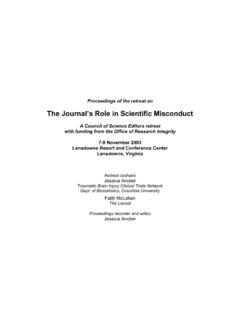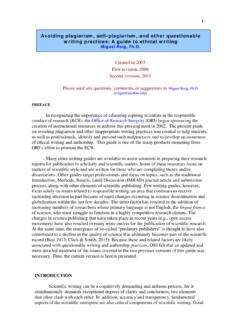Transcription of Guidelines for Responsible Data Management in Scientific …
1 Guidelines for Responsible Data Management in Scientific research Developed by: Funded by: Office of research Integrity US Department of Health and Human Services About the Course Data Management is one of the essential areas of Responsible conduct of research , as outlined by the Office of research Integrity.
2 This educational course will educate new investigators about conducting Responsible data Management in Scientific research . Researchers who are considering submitting a federal grant or contract for the first time can also benefit from this introductory course on data Management , as can other research team members. The course includes background information about the topic, best practice Guidelines , various learning features, and a resource section. Learning Objectives After taking the course, learners will be able to Understand the general rules of appropriate data Management in accordance with Responsible conduct of research Understand how to define roles and responsibilities of research staff regarding data Management Develop and implement a communication plan for dealing with data Management issues among the research team Utilize the information featured in the course to implement a system for conducting Responsible data Management Online Version This course was previously available on the Internet at The website is not active at this time.
3 Meghan B. Coulehan, MPH Jonathan F. Wells, BA Development of this website was funded by the Office of research Integrity (ORI) Responsible Conduct of research Resource Development Program. Feel free to contact us with comments or questions. You can reach Project Director, Meghan Coulehan, at 1 Introduction Data Management is one of the core areas addressed by the Office of Data Management is one of research Integrity (ORI) in its Responsible conduct of research initiative (see 9 core areas addressed by links in sidebar).
4 This important, multifaceted issue affects all health the Office of research researchers and deserves extra attention and diligence. Integrity's Responsible Oversight of data Management represents a significant investment of time and conduct of research effort by the Principal Investigator (PI) of a research project. For oversight to initiative. be thorough and correct, PIs must understand the basic concepts of data Management and ensure that every member of the research project team is involved in the planning, implementation, and maintenance of data Management policies and procedures. To learn more about the ORI or the Responsible conduct in research initiative, check out the following links: US Department of Health and Human Services' ORI website [ ] ORI's Introduction to the Responsible Conduct of research [ ] 2 Overview.
5 Concepts of Data Management Before starting a new Scientific research project, the PI and research team must address issues related to data Management , including the following: Key Concept How It Relates to Responsible Conduct of research Data Ownership This pertains to who has the legal rights to the data and who retains the data after the project is completed, including the PI's right to transfer data between institutions. Data Collection This pertains to collecting project data in a consistent, systematic manner ( , reliability) and establishing an ongoing system for evaluating and recording changes to the project protocol ( , validity). Data Storage This concerns the amount of data that should be stored -- enough so that project results can be reconstructed.
6 Data Protection This relates to protecting written and electronic data from physical damage and protecting data integrity, including damage from tampering or theft. Data Retention This refers to the length of time one needs to keep the project data according to the sponsor's or funder's Guidelines . It also includes secure destruction of data. Data Analysis This pertains to how raw data are chosen, evaluated, and interpreted into meaningful and significant conclusions that other researchers and the public can understand and use. Data Sharing This concerns how project data and research results are disseminated to other researchers and the general public, and when data should not be shared. Data Reporting This pertains to the publication of conclusive findings, both positive and negative, after the project is completed.
7 (Steneck, 2004) The pages that follow will provide more in-depth descriptions of each of these terms and will explain how each one relates to the Responsible conduct of research . It is important for researchers to understand how data Management issues relate to the Responsible conduct of research . You can print out the worksheet version of this page to share with your entire research team. This worksheet is included at the end of the document. 3 Think Ahead Quiz: What Are Data?
8 True or False: In Scientific research , only the information and observations that are made as part of Scientific inquiry are considered data. __True __False Answer: False. In fact, data also include the materials, products, procedures, and other data sources that are part of the research project. Essentially, data are considered to be anything and everything that informs the way in which individuals are able to understand and to process their world. Read on to learn more. Defining Data Before reviewing the concepts of data Management , the term data should be defined. The Merriam-Webster Dictionary (2005) defines data as "factual information (as measurements or statistics) used as a basis for reasoning, discussion, or calculation." According to this definition, some examples of types of medical research data would include the following: Patient survey responses White blood cell counts Core temperature readings Metabolism rates However, data can also refer to any observations that are made -- such as a patient's symptoms or a population's health habits.
9 Other Forms of Data Data are not only the information and observations made as part of Scientific inquiry but also the materials, the means, and the products of that inquiry (these are sometimes called data sources). In other words, data can also include the following: Tissue samples Specially designed primers Patient questionnaires Interviews Customized online content Data are any information or observations that are associated with a particular project, including experimental specimens, technologies, and products related to the inquiry. 4 Case Vignette: Data Ownership Dr.
10 Smith works at The University and is the Principal Investigator on a large research project that is funded by the National Institutes of Health (NIH). However, while Dr. Smith wrote the original grant proposal, he does very little day-to-day work on the project. Instead, the research Director, Betsy, oversees all aspects of the project, including staff supervision and all data Management activities. In addition, Betsy has been lead author on several publications about the project's research findings. Who owns the project and its data? __ The PI, Dr. Smith __ The research Director, Betsy __ The University __ The National Institutes of Health __ No one person or organization Answer: The University. Despite the PI's and the research Director's work on the project, the sponsoring institution typically maintains ownership of a project's data as long as the PI submitted the grant through that institution and is employed by them.









